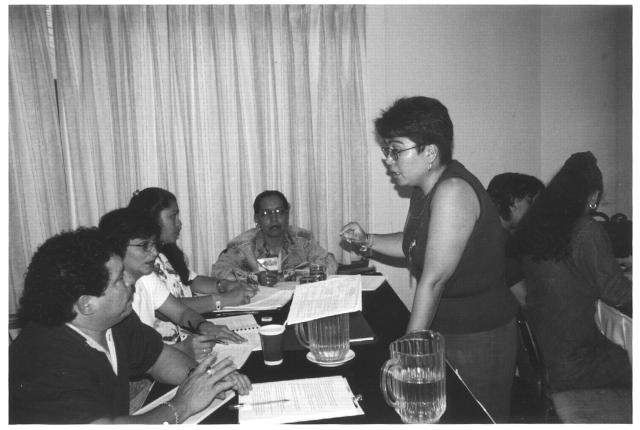Abstract
The Cooperative for Assistance and Relief Everywhere (CARE) and Centers for Disease Control and Prevention (CDC) Health Initiative in Nicaragua is distinctive in its focus on developing a cadre of in-country trainers whose aim is to equip frontline public health managers with widely applicable tools and techniques to assist them in identifying and solving implementation problems. Since 1999, 137 trainees—37% more than originally planned—have demonstrated competence by completing and presenting applied management projects. Nineteen professors from the preventive medicine faculty at the Autonomous University of Nicaragua also have been trained. The country office now has a cadre of seasoned trainers who can meet the ongoing management training needs of CARE staff and their counterparts in the Ministry of Health and in other nongovernmental organizations.
PUBLIC HEALTH INITIATIVES in developing countries often fail not because of a lack of scientific knowledge but because of a lack of managerial competence.1 Most training programs follow categorical funding and have a narrow focus on a particular disease or problem. Emphasis usually is placed on prescriptive management procedures oriented toward technical protocols designed by external experts (e.g., family planning logistics, vaccine cold chain maintenance, treatment protocols, agricultural protocols, infrastructure models). A successful program should equip frontline managers with crosscutting skills in priority setting, planning, and problem solving.2
Lack of management skills among the public workforce has been exacerbated in recent years by the global trend toward decentralization of services.3,4 In many countries, decentralization has occurred abruptly and without the benefit of planning for developing the management capacity of the local public workforce to assume their new roles and responsibilities.3, 5
In Nicaragua, a Central American country with a population of approximately 5 million people, decentralization has led to about 150 municipios' (the smallest political/administrative units) becoming responsible for local health services. The Ministry of Health operates about 60% of the country's health facilities through its structure of local health systems (SILAIS). Under a 1995 agreement with SILAIS, CARE's health sector professionals provide training to staff members of local health services in a wide range of programmatic areas. CARE staff also assist SILAIS supervisors with joint supervisory visits to municipio health services. In 1999, CARE International and the Centers for Disease Control and Prevention's (CDC) Sustainable Management Development Program (SMDP) began to collaborate to strength-en management training capacity in Nicaragua by developing a cadre of in-country trainers in public health management.
DISCUSSION AND EVALUATION
The public management development project began with the goal of developing a cadre of public health management trainers who could meet the ongoing management training needs of CARE Nicaragua's internal staff and their counterparts in the Ministry of Health and other nongovernmental organizations (NGOs).
The Nicaragua project incorporates a standard cycle of training consisting of 2 workshops and a concluding presentation. The first workshop is 5 days long and covers team building, behavioral styles, and total quality management (TQM). After the workshop, trainees are required to complete an applied learning project and demonstrate competence in newly acquired managerial tools and techniques by disseminating to their peers the concepts they have learned as they lead their local team in developing the learning project over a period of 2 to 3 months. During this phase, workshop faculty members provide direct supervision at the trainees' work sites. The trainees then attend a 2-day workshop on effective presentation skills. In a concluding presentation 1 month later, trainees present their applied projects to their peers and an invited audience from the Ministry of Health and the donor community.
Because of the initial shortage of experienced management trainers in Nicaragua, SMDP-trained personnel from Mexico's General Directorate of Epidemiology provided technical assistance and were the lead facilitators for the first workshop. Eight staff members from CARE Nicaragua were trained in facilitation and supervision skills related to TQM, and they became responsible for the next cycle of training and field supervision. Successful implementation of applied projects required supervisors with time available for on-site coaching. Trainees benefited from on-site visits from supervisors to review and reinforce concepts learned in the workshop setting.
The first phase of the CDC– CARE collaboration in Nicaragua produced a seasoned cadre of public health management trainers. During 6 training cycles, 137 Nicaraguan health and development professionals were trained—37% more than originally planned. Trainees' applied projects have addressed a wide range of issues (e.g., unreliable laboratory results, inappropriate use of antibiotics, maternal mortality, lack of teamwork, low practice of exclusive breastfeeding, low stock of essential medicines at health posts, overprescription of antibiotics in pediatric care, low accomplishment of goals in maternal and child care programs, low malaria smear rates, lack of effective counseling of mothers in pediatric care, delays in purchase of materials and supplies, low income in families participating in an agricultural project, increased number of and fatalities from transit accidents, increased number of high-risk pregnancies). The training team has acquired a library of Spanish-language training videos and has produced a variety of student handbooks and teaching materials in Spanish. Table 1 ▶ summarizes participation to date.
TABLE 1—
Number of Participants by Cycle and Organization: Nicaragua, March 2000–March 2001
| Cohort Number | Number of Participants | Participating Organization | Facilitator |
| 1 | 20 | Ministry of Health and CARE | Mexico |
| 2 | 18 | Ministry of Health and CARE | Nicaragua |
| 3 | 19 | Ministry of Health and CARE | Nicaragua |
| 4 | 19 | National Autonomous University | Nicaragua |
| 5 | 36 | Ministry of Health personnel | Nicaragua |
| 6 | 25 | NICASALUD | Nicaragua |
| Total | 137 |
Note. NICASALUD = Nicaragua Consortium of Nongovernmental Organizations Network for Health.
In the fall of 2000, 2 participants from Nicaragua were trained as “master trainers” at the Management for International Public Health course in Atlanta, thereby reducing Nicaragua's reliance on assistance from outside the country. Members of the sixth cohort will complete their projects and graduate in the summer of 2001. This last group from the first phase belongs to a health network called the Nica-ragua Consortium of NGOs Network for Health (NICASALUD), which reaches a total population of 400 000. To ensure project sustainability, professors from the preventive medicine faculty at the Autonomous University of Nicaragua (UNAN–Managua) also have been trained. As a result of this training, an agreement between CARE and UNAN–Managua is being developed, under which CARE will provide technical assistance and materials and the university will include TQM in its curricula for medical students. This effort adds dimension and depth to the project because all medical doctors graduating from UNAN–Managua will have needed management skills when they begin to work in the field.
CONCLUSION
The goal of the collaboration between CARE International and the CDC was the development of a strong Nicaraguan capacity to provide high-quality management training to the public health workforce and managers from CARE counterparts. Although trainees were slow to adapt to a training model that required them to complete a learning project, and high turnover in government personnel was a significant challenge, the strategy to establish a cadre of in-country trainers was successful, and 137 managers were trained.
A wide variety of themes was selected by the teams; common elements were team-building approaches; prioritizing problems; and designing, implementing, and monitoring operational plans tailored to their needs. The country office now has a cadre of seasoned trainers who can meet the ongoing management training needs of CARE staff and their counterparts in the Ministry of Health and in other NGOs.
HIGHLIGHTS
• Since 1999, 137 Nicaraguan health and development professionals—37% more than planned—have been trained in public health management.
• Trainees have demonstrated competence by completing and presenting applied management projects on a wide variety of subjects.
• To ensure sustainability, 19 professors from the preventive maintenance faculty at the Autonomous University of Nicaragua also have been trained.
• Nicaragua now has a cadre of seasoned trainers to meet the management training needs of CARE staff and their counterparts in the Ministry of Health and other nongovernmental organizations.
Results From a Trainee's Applied Management Learning Project
A project begun at the June 1999 workshop by the staff of Matiguas Health Center demonstrated the usefulness of the TQM problem-solving approach applied to the issue of the poor quality of Papanicolaou (Pap) tests taken at the center. During early 1999, the reference laboratory in Matagalpa routinely gave feedback that the quality of slides was so unacceptable that none could be read accurately. As a result, the health center was unable to detect abnormalities and begin appropriate treatment of precancerous and suspected cancerous growths. Among the 486 Pap tests taken during January–June 1999, no abnormalities were detected. A systematic investigation with TQM techniques was conducted, and root causes were identified. The most significant cause was incorrect laboratory technique in applying fixative to the slides. During the summer of 1999, training in laboratory techniques was conducted, after which 521 Pap tests were collected from July 1999 to December 1999. Laboratory examination of these slides detected 13 papilloma infections, 2 cervical intraepithelial neoplasia (CIN) stage I growths, 7 CIN II growths, and 3 CIN III growths.
As a result of these improvements in laboratory procedures, the Matiguas Health Center was able to detect abnormalities and refer women to appropriate treatment for infections and suspected cancers that previously would have gone undetected.
Figure 2.
Figure 1.
Dr Maria Jesus Hoy from Mexico's General Directorate of Epidemiology explaining a point during a public health management workshop in Nicaragua.
Acknowledgments
E. McEwan and D. L. Bull are the project officers responsible for the implementation of public health management training activities in Nicaragua, and they prepared the initial draft. M. J. Conway and M. D. Malison made revisions.
Peer Reviewed
References
- 1.Rondinelli DA. Why development projects fail: problems of project management in developing countries. Project Management Quarterly. 1976;7: 10–15. [Google Scholar]
- 2.Robbins A. Brundtland's World Health Organization: a test case for United Nations reform. Public Health Rep. 1999;114:30–39. [DOI] [PMC free article] [PubMed] [Google Scholar]
- 3.Philippines Devolution and Health Services: Managing Risks and Opportunities. Washington, DC: World Bank; May 23, 1994. Report 12343-PH.
- 4.Malison MD, Bull DL, Abamonte PA, Johnson SN, Lyons CC, Wilson GA. Management for international public health: CDC's Sustainable Management Development Program. Leadership Public Health. Spring 2000:24–28.
- 5.Fiske E. The Politics of Decentralization [Decentralization and Education Reform Program background paper]. Washington, DC: Human Development Department, World Bank; February 20, 1996.




